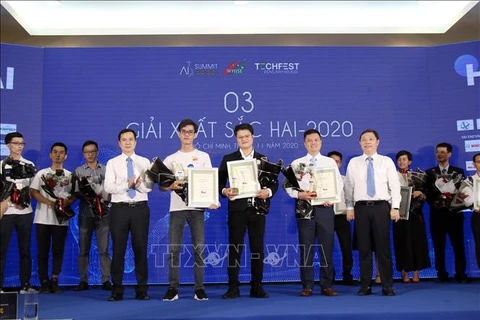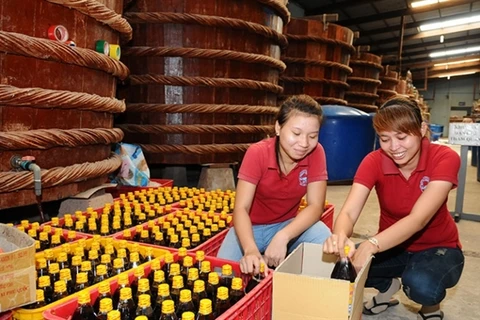Hanoi (VNS/VNA) - Support is to be provided to small and medium–sized enterprises (SMEs), enabling them to use intellectual property (IP) rights to build stronger, more competitive and resilient businesses, said Dinh Huu Phi, Director of the Intellectual Property Office of Vietnam.
SMEs took centre stage at this year’s celebration of World Intellectual Property Day (April 26) with the World Intellectual Property Organisation (Wipo) Director General Daren Tang describing them as an engine for growth in a post-pandemic world.
Phi said that SMEs played a significant role in global economies, citing statistics that SMEs accounted for 90 percent of all companies worldwide and contributed 40 percent of gross domestic product (GDP). In Vietnam, the figures were 97 percent and 47 percent, respectively.
Commercialising IP and using it for business growth was critical for SMEs in a post-pandemic world, he said.
Phi said that efforts were being made to improve the mechanisms and policies to create favourable conditions for enterprises in creating, forming, exploiting and protecting their intellectual property rights.
Specially, the national IP strategy by 2020 put SMEs as a focus, which aimed to encourage innovation and cooperation between enterprises and research institutes and universities to develop IP assets for socio-economic development goals.
He said that support would be provided to IP development and protection for key products of Vietnam and products of the “One Commune, One Product” programme.
Accordingly, the focus would be placed on building and implementing a management system for geographical indication, certification marks, collective mark associated with the registration of cultivation area code, food safety, quality certification and traceability as well as developing the value chain for protected products.
It was also important to enhance trade promotion activities to promote the commercialisation of IP assets, he said.
During the past five years, more than 500 key agricultural products received support from the IP asset development programme. The IP Office of Vietnam was also providing support in terms of geographical indication protection in Japan for Luc Ngan lychee, Binh Thuan dragon fruit and Buon Ma Thuot coffee.
Support in terms of trademark protection were also provided to Thai Nguyen tea and Chu noodles.
Phi said that many protected products were recognised widely with increased added value, such as Cao Phong orange, Phu Quoc fish sauce, Luc Ngan lychee, Ha Giang orange and Ben Tre green-skin pomelo.
No one can register exclusive trademark for ST25
Regarding the applications for “ST25” rice by five US firms submitted to the US Patent and Trademark Office (USPTO) which triggered concerns that exports of this rice to the US would be affected, Nguyen Van Bay, Deputy Director of the IP Office of Vietnam, late last week said that no one could obtain exclusive protection for ST25 mark for a rice product from the ST25 rice variety.
The rice variety named ST25 has been granted the Protection Certificate No 21.VN.2020 under Decision No 45/QĐ-TT-VPBH dated March 6, 2020 by the Ministry of Agriculture and Rural Development’s Department of Crop Production. The holder of the certificate was the private company Ho Quang Tri and the breeders of the rice variety were scientist-farmer Ho Quang Cua and his colleagues, Tran Tan Phuong and Nguyen Thi Thu Huong.
Bay said that the rice variety was different from the rice made of this variety, adding that ST25 was name of a generic rice variety, not a brand, and rice made from this variety would be called ST25 rice when sold in the market.
Each company must develop their own brand name for their ST25 rice, for example ST25 Bao Minh.
He stressed that it was impossible for foreign companies to register Vietnamese rice ST25 as an exclusive trademark protection, according to the Law on IP.
ST25 rice won the top prize at the World's Best Rice Contest in the Philippines in 2019, marking the first time a Vietnamese rice variety won the title in the contest’s 11-year history. ST25 rice won second place at the event in 2020./.
SMEs took centre stage at this year’s celebration of World Intellectual Property Day (April 26) with the World Intellectual Property Organisation (Wipo) Director General Daren Tang describing them as an engine for growth in a post-pandemic world.
Phi said that SMEs played a significant role in global economies, citing statistics that SMEs accounted for 90 percent of all companies worldwide and contributed 40 percent of gross domestic product (GDP). In Vietnam, the figures were 97 percent and 47 percent, respectively.
Commercialising IP and using it for business growth was critical for SMEs in a post-pandemic world, he said.
Phi said that efforts were being made to improve the mechanisms and policies to create favourable conditions for enterprises in creating, forming, exploiting and protecting their intellectual property rights.
Specially, the national IP strategy by 2020 put SMEs as a focus, which aimed to encourage innovation and cooperation between enterprises and research institutes and universities to develop IP assets for socio-economic development goals.
He said that support would be provided to IP development and protection for key products of Vietnam and products of the “One Commune, One Product” programme.
Accordingly, the focus would be placed on building and implementing a management system for geographical indication, certification marks, collective mark associated with the registration of cultivation area code, food safety, quality certification and traceability as well as developing the value chain for protected products.
It was also important to enhance trade promotion activities to promote the commercialisation of IP assets, he said.
During the past five years, more than 500 key agricultural products received support from the IP asset development programme. The IP Office of Vietnam was also providing support in terms of geographical indication protection in Japan for Luc Ngan lychee, Binh Thuan dragon fruit and Buon Ma Thuot coffee.
Support in terms of trademark protection were also provided to Thai Nguyen tea and Chu noodles.
Phi said that many protected products were recognised widely with increased added value, such as Cao Phong orange, Phu Quoc fish sauce, Luc Ngan lychee, Ha Giang orange and Ben Tre green-skin pomelo.
No one can register exclusive trademark for ST25
Regarding the applications for “ST25” rice by five US firms submitted to the US Patent and Trademark Office (USPTO) which triggered concerns that exports of this rice to the US would be affected, Nguyen Van Bay, Deputy Director of the IP Office of Vietnam, late last week said that no one could obtain exclusive protection for ST25 mark for a rice product from the ST25 rice variety.
The rice variety named ST25 has been granted the Protection Certificate No 21.VN.2020 under Decision No 45/QĐ-TT-VPBH dated March 6, 2020 by the Ministry of Agriculture and Rural Development’s Department of Crop Production. The holder of the certificate was the private company Ho Quang Tri and the breeders of the rice variety were scientist-farmer Ho Quang Cua and his colleagues, Tran Tan Phuong and Nguyen Thi Thu Huong.
Bay said that the rice variety was different from the rice made of this variety, adding that ST25 was name of a generic rice variety, not a brand, and rice made from this variety would be called ST25 rice when sold in the market.
Each company must develop their own brand name for their ST25 rice, for example ST25 Bao Minh.
He stressed that it was impossible for foreign companies to register Vietnamese rice ST25 as an exclusive trademark protection, according to the Law on IP.
ST25 rice won the top prize at the World's Best Rice Contest in the Philippines in 2019, marking the first time a Vietnamese rice variety won the title in the contest’s 11-year history. ST25 rice won second place at the event in 2020./.
VNA























